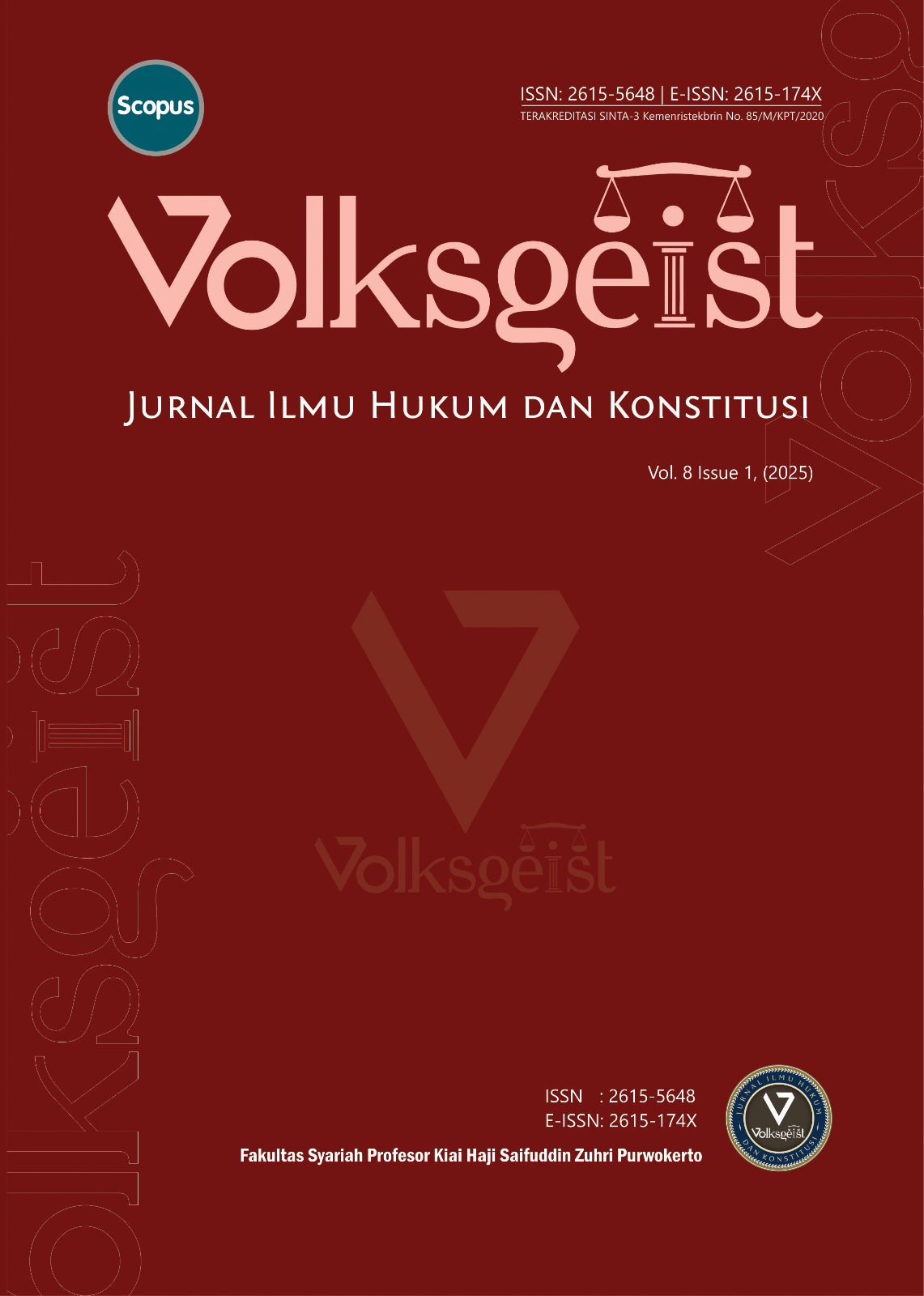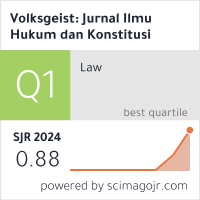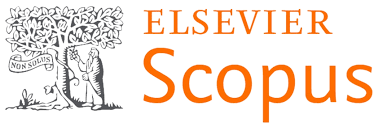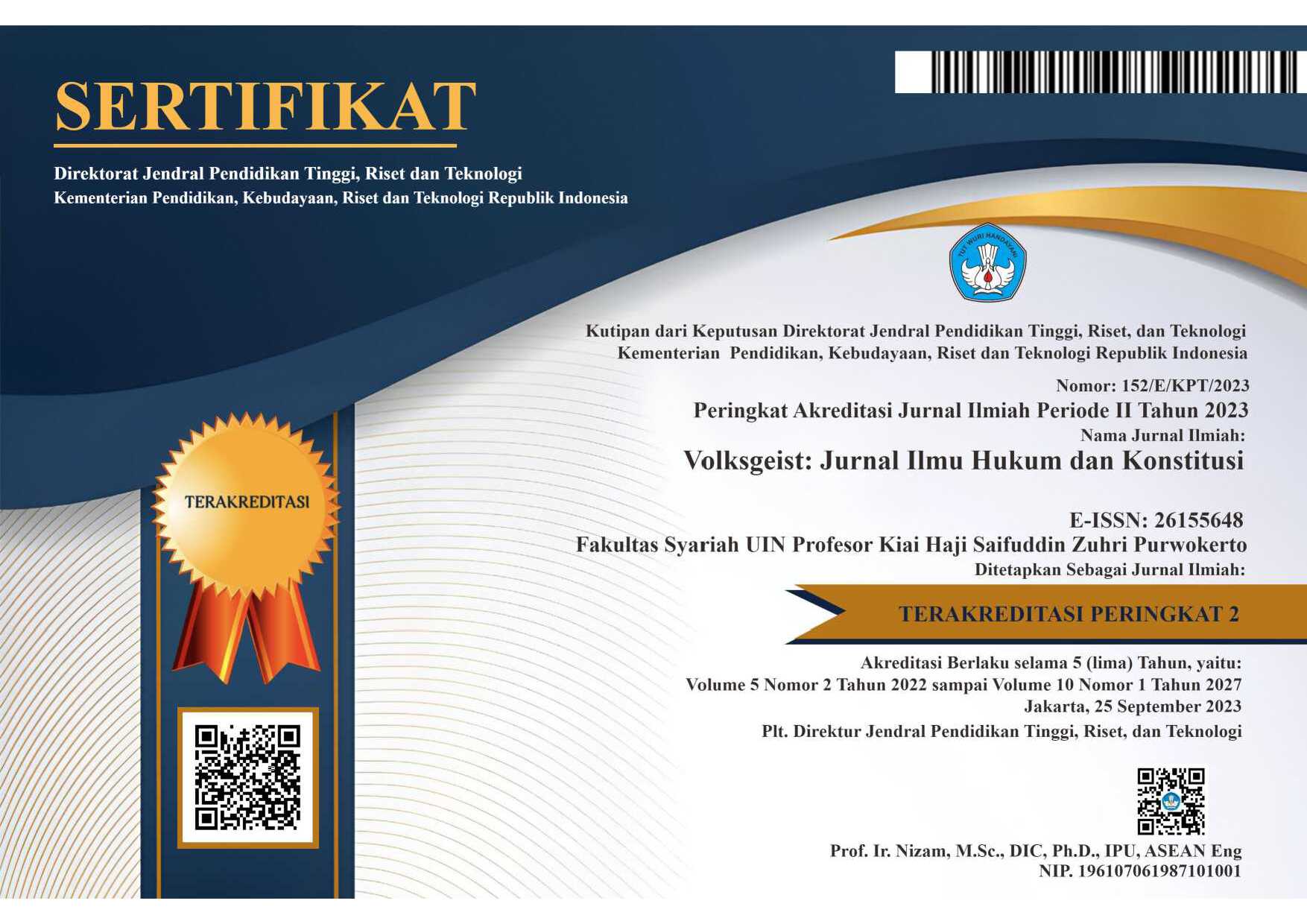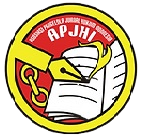Toward a Holistic Legal Framework for Effective Waqf Implementation: Integrating Islamic Socio-Economic Models
DOI:
https://doi.org/10.24090/volksgeist.v8i1.12590Keywords:
Islamic social; legal framework; waqf implementation.Abstract
Waqf is crucial in the improvement of community welfare and the resolution of socio-economic challenges. Nevertheless, its implementation in Indonesia is beset by various legal, institutional, and managerial obstacles, such as insufficient regulations, a lack of public awareness, and inefficient governance. This research aims to evaluate the legal framework for the effective integration of the Islamic socio-economic model into the waqf process. This normative legal study employs a regulatory-legislative approach, conceptualization, and Lawrence M. Friedman's legal system theory to evaluate the efficacy of regulations concerning waqf. The research's findings suggest that Indonesia's waqf regulations continue to encounter legal challenges, particularly in conjunction with the discordant regulations in settlement and the lax rules regarding productive waqf. The effectiveness of the waqf administration is impeded by the lack of professionalism of the nazhir and the weaknesses in the supervision of the Indonesian Waqf Board (BWI) regarding legal structure. In the meantime, the legal culture demonstrates that the community's low legal awareness results in the inadequate documentation of numerous waqf assets, rendering them susceptible to protection and underutilization. Consequently, it is imperative to enhance the professionalism of nazhir, revise regulations, and digitize waqf management to improve transparency and efficiency. Community participation and more stringent supervision are also necessary for optimizing waqf as an economic and social instrument.Downloads
References
Abdullah, Agung. “Nadzir Dalam Perspektif Kelembagaan Wakaf Di Indonesia.” Jurnal Ilmiah Ekonomi Islam 6, no. 3 (October 2020): 403. https://doi.org/10.29040/jiei.v6i3.1216.
Ahyani, Hisam, Ending Solehudin, Naeli Mutmainah, and Nurul Ilyana Muhd Adnan. “Integration of Productive Waqf in Sharia Insurance: Enhancing Investment and Life Protection.” Review of Islamic Social Finance and Entrepreneurship, September 2024, 169–83. https://doi.org/10.20885/RISFE.vol3.iss2.art5.
Alam, Nur, Salmawati Salmawati, and Zainuddin Zainuddin. “The Role of Nadzir in Resolving Waqf Land Disputes.” Golden Ratio of Law and Social Policy Review 3, no. 2 (June 2024). https://doi.org/10.52970/grlspr.v3i2.329.
Ali, Ahmad Syihan, Heru Fahlevi, and Mulia Saputra. “Accountability and Management of Waqf: An Analysis of Waqf Practice in Banda Aceh, Indonesia.” Journal of Accounting Research, Organization and Economics 2, no. 1 (June 2019): 11–19. https://doi.org/10.24815/jaroe.v2i1.12866.
Ali Azizan, Norfaridah, Amirul Afif Muhamat, Sharifah Faigah Syed Alwi, Husniyati Ali, and Amalia Qistina Casteneda Abdullah. “Revitalising Waqf (Endowment) Lands for Agribusiness: Potentials of the Anchor Company Models.” Journal of Agribusiness in Developing and Emerging Economies 12, no. 3 (May 2022): 345–70. https://doi.org/10.1108/JADEE-05-2021-0128.
Alshater, Muneer M., Irum Saba, Indri Supriani, and Mustafa Raza Rabbani. “Fintech in Islamic Finance Literature: A Review.” Heliyon 8, no. 9 (September 2022): e10385. https://doi.org/10.1016/j.heliyon.2022.e10385.
Andikatama, Achmad Zulfa, Islamiyati, and Muhyidin. “Legal Issue of Cash WAQF Institution in Indonesia and the Legal Solution.” Science of Law 2024, no. 3 (November 2024): 8–12. https://doi.org/10.55284/sol.v2024i3.140.
Ari, Ibrahim, and Muammer Koc. “Towards Sustainable Financing Models: A Proof-of-Concept for a Waqf-Based Alternative Financing Model for Renewable Energy Investments.” Borsa Istanbul Review 21 (August 2021): S46–56. https://doi.org/10.1016/j.bir.2021.03.007.
Arief, Suyoto, Nurul Adilah Binti Hasbullah, Vina Fithriana Wibisono, Arizqia Nurfattah, and Nurmayunita. “Analysing The Effectiveness of Stock Waqf Management in Indonesia and Malaysia: Regulation Practices and Nadzir Readiness,” 85–91, 2023. https://doi.org/10.2991/978-94-6463-346-7_17.
Asyiqin, Istianah Zainal, M Fabian Akbar, and Manuel Beltrán Genovés. “Cryptocurrency as a Medium of Rupiah Exchange: Perspective Sharia Islamic Law and Jurisprudential Analysis.” Volksgeist: Jurnal Ilmu Hukum Dan Konstitusi 7, no. 2 SE-Articles (November 2024): 227–92. https://doi.org/10.24090/volksgeist.v7i2.10975.
Avdukic, Alija, and Mehmet Asutay. “Testing the Development Impact of Islamic Banking: Islamic Moral Economy Approach to Development.” Economic Systems, May 2024, 101229. https://doi.org/10.1016/j.ecosys.2024.101229.
Azham, Nur Izzatul Afrina. “Islamic Finance for Social Good: Exploring the Synergy Between Sukuk and Waqf.” SSRN Electronic Journal, 2024. https://doi.org/10.2139/ssrn.4845573.
Basir, Khairul Hidayatullah, and Amnisuhailah Abarahan. “Islamic Crowdfunding: Principles, Practices, and Impact on Business Management.” In Reference Module in Social Sciences. Elsevier, 2024. https://doi.org/10.1016/B978-0-443-13701-3.00518-1.
Bushra, M.T.F., S.M.M. Nafees, M.M.A. Abdullah, and S.M.M. Mazahir. “Management of Waqf Properties: A Case Study in Sri Lanka.” Sprin Journal of Arts, Humanities and Social Sciences, June 2022, 300–310. https://doi.org/10.55559/sjahss.v1i06.32.
Dallh, Minlib. “Accumulate but Distribute: Islamic Emphasis on the Establishment of Waqf (Pious Endowment).” Religion and Development 2, no. 1 (September 2023): 21–40. https://doi.org/10.30965/27507955-20230014.
Endang Suhendra, Henry Aspan, and Bambang Fitrianto. “The Problematic Management Of Waqf In Subulussalam (The Overlap Between Law Number 41 Of 2004 And Qanun Aceh Number 10 Of 2018).” LITERACY : International Scientific Journals of Social, Education, Humanities 2, no. 3 (October 2023): 43–57. https://doi.org/10.56910/literacy.v2i3.977.
Fahmi, Nazil, Hasbi Hasbi, Berlian Gobo, Mirnawati Mirnawati, and Moh Helmi. “THE COMPLEXITY OF WAQF LAND IN THE CONTEXT OF CUSTOMARY LAW IN INDONESIA.” Tadayun: Jurnal Hukum Ekonomi Syariah 5, no. 1 (June 2024): 29–50. https://doi.org/10.24239/tadayun.v5i1.268.
Faisal, Faisal, Fathul Mu’in, Relit Nur Edy, Gandhi Liyorba Indra, and Rudi Santoso Santoso. “Strengthening the National Waqf Ecosystem through Legal Reform: An Analysis of Waqf Issues in the Provinces of Lampung and South Sumatra.” Al-Istinbath: Jurnal Hukum Islam 9, no. 1 (May 2024): 81. https://doi.org/10.29240/jhi.v9i1.9320.
Fajri, Nurul Irhamni, Muh Wahyuddin Abdullah, and Mustafa Umar. “Pengelolaan Dan Pemberdayaan Harta Benda Wakaf Berdasarkan Prinsip Maqashid Asy-Syariah (Studi Kasus Desa Pakatto Kabupaten Gowa).” At Tawazun Jurnal Ekonomi Islam 2, no. 1 (April 2022): 16–30. https://doi.org/10.24252/attawazun.v2i1.26949.
Fikry, Muhammad Syaikhul, and Muhammad Lathoif Ghozali. “Tinjauan Ekonomi Syariah Terhadap Strategi Pemberdayaan Ekonomi Masyarakat Di MWC NU Dukun Dan Panceng Gresik.” Jurnal Ilmiah Ekonomi Islam 8, no. 03 (2022): 2456–72.
Fitrianto, Nanang Cahyo. “REVIEW OF ISLAMIC LAW ON THE IMPLEMENTATION OF WAQFAN (CASE STUDY AT AL HIDAYAH MOSQUE, WINONG DUSUN, JATISAWIT VILLAGE, JATIYOSO DISTRICT, KARANGANYAR DISTRICT, 2023).” Indonesian Journal of Sharia and Law 1, no. 1 (February 2024): 1–6. https://doi.org/10.54622/ijsl.v1i1.270.
Hakim, Muhammad Lutfi. “Islamic Law and Society in Indonesia: Corporate Zakat Norms and Practices in Islamic Banks , by Alfitri.” Bijdragen Tot de Taal-, Land- En Volkenkunde / Journal of the Humanities and Social Sciences of Southeast Asia 179, no. 1 (March 2023): 115–18. https://doi.org/10.1163/22134379-17901001.
Hariyanto, Hanif Fudin, Muhammad Fauzan, Kadar Pamuji, and Tedi Sudrajat. “The Communal Democracy of Yogyakarta Special Region’s Government on the Islamic Law Eclecticism Perspective.” AL-IHKAM: Jurnal Hukum & Pranata Sosial 18, no. 1 (June 2023): 200–221. https://doi.org/10.19105/al-lhkam.v18i1.7403.
Hariyanto, Hariyanto, Mabarroh Azizah, and Nurhidayatuloh Nurhidayatuloh. “Does the Government’s Regulations in Land Ownership Empower the Protection of Human Rights?” Journal of Human Rights, Culture and Legal System 4, no. 2 (May 2024): 391–421. https://doi.org/10.53955/jhcls.v4i2.222.
Hariyanto, Hariyanto, Muhammad Mutawalli Mukhlis, and Daud Rismana. “The Role and Authority of the Deputy Regional Head According to Islamic Principles within the Framework of Regional Government Law.” Juris: Jurnal Ilmiah Syariah 24, no. 1 (2025): 13–27. https://doi.org/10.31958/juris.v24i1.12678.
Hartanto, Selamet, May Shinta Retnowati, and Devid Frastiawan Amir Sup. “Waqf in the Perspective of Waqf Rules in Indonesia.” Al-Iktisab: Journal of Islamic Economic Law 5, no. 1 (June 2021): 37. https://doi.org/10.21111/al-iktisab.v5i1.6203.
Hidayat, Achmad, and Salina Kassim. “Understanding Islamic Digital Banking Services in Indonesia.” In Reference Module in Social Sciences. Elsevier, 2024. https://doi.org/10.1016/B978-0-443-13701-3.00545-4.
Humaidi, M. Wildan, Hariyanto Hariyanto, and Mabarroh Azizah. “Green Philanthropy: Islamic Activism on Indonesia’s Environmental Democracy.” Ijtihad : Jurnal Wacana Hukum Islam Dan Kemanusiaan 24, no. 2 (December 2024): 167–91. https://doi.org/10.18326/ijtihad.v24i2.167-191.
Ilyas, Muhammad, Mifathul Huda, and Faisal Faisal. “The Problem of Waqf Land Legality in Sarmi Regency: A Sociological Perspective of Law.” Al-Bayyinah 7, no. 2 (November 2023): 158–74. https://doi.org/10.30863/al-bayyinah.v7i2.4326.
Irawan, Armalia Berlinda, Rahayu Subekti, and Bobur Baxtishodovich Sobirov. “Legal Protection in Land Acquisition for Public Interest: A Dilemma Between State Regulation and Social Welfare.” Journal of Sustainable Development and Regulatory Issues (JSDERI) 2, no. 2 (May 2024): 148–68. https://doi.org/10.53955/jsderi.v2i2.38.
Ishak, Amal Hayati, Siti Nor Amira Mohamad, Siti Khadijah Ab Manan, Muhamad Hasif Yahaya, Wan Naimah Wan Daud, and Dziauddin Sharif. “The Critical Success Factors of Waqf Land Development for Sustainable Agriculture.” Social Sciences & Humanities Open 11 (2025): 101244. https://doi.org/10.1016/j.ssaho.2024.101244.
Islamy, Shendy Rianti, Audia Andini Ariputri, Belinda Soegijanto, and Willy Democitta Tanaya. “Juridical Consequences and Legal Protection for Unregistered Waqf Land.” LEGAL BRIEF 12, no. 1 (April 2023): 166–75. https://doi.org/10.35335/legal.v12i1.760.
Ismail, Wan Musyirah Wan. “Significance of Technology to Cash Waqf Collection: Application of Unified Theory Acceptance and Use of Technology (UTAUT).” International Journal of Academic Research in Business and Social Sciences 11, no. 1 (January 2020). https://doi.org/10.6007/IJARBSS/v11-i1/8994.
Jaelani, Abdul Kadir, Reza Octavia Kusumaningtyas, Resti Dian Luthviati, Sholahuddin Al Fatih, and Ahmad Siboy. “Green Legality Certificate on Agrarian Reform: Indonesian Experience.” KnE Social Sciences, January 2024. https://doi.org/10.18502/kss.v8i21.14713.
Jahar, Asep Saepudin. “Bureaucratizing Sharia in Modern Indonesia: The Case of Zakat, Waqf and Family Law.” Studia Islamika 26, no. 2 (August 2019): 207–45. https://doi.org/10.15408/sdi.v26i2.7797.
Judijanto, Loso, Nurjanna Ladjin, and Salwa Aulia Novitasari. “Effectiveness of Productive Waqf Management in Improving the Welfare of the Poor: A Bibliometric Review.” West Science Social and Humanities Studies 2, no. 10 (October 2024): 1613–22. https://doi.org/10.58812/wsshs.v2i10.1334.
Khalid, Mohammad Mahyuddin, Mohd Ashrof Zaki Yaakob, Azri Bhari, and Mohd Faiz Mohamed Yusof. “Risk Management in Waqf Institutions: A Preliminary Study.” Journal of Fatwa Management and Research, October 2019, 207–19. https://doi.org/10.33102/jfatwa.vol16no2.16.
Kühn, Miriam. “The Epigraphical Program of Mamluk Minbars: Religious and Quranic Inscriptions Emphasizing Minbars as a Site for Preaching.” Journal of Material Cultures in the Muslim World 4, no. 1 (November 2023): 35–77. https://doi.org/10.1163/26666286-12340039.
Lestari, Yuliani Dwi, Raditya Sukmana, Irfan Syauqi Beik, and Mahfud Sholihin. “The Development of National Waqf Index in Indonesia: A Fuzzy AHP Approach.” Heliyon 9, no. 5 (May 2023): e15783. https://doi.org/10.1016/j.heliyon.2023.e15783.
Marom, Roy, and Itamar Taxel. “Ḥamāma: The Historical Geography of Settlement Continuity and Change in Majdal ‘Asqālan’s Hinterland, 1270–1750 CE.” Journal of Historical Geography 82 (October 2023): 49–65. https://doi.org/10.1016/j.jhg.2023.08.003.
Masrizal, Masrizal, Raditya Sukmana, Budi Trianto, and Annisa Masruri Zaimsyah. “Determinant Factor of Crowdfunders’ Behavior in Using Crowdfunding Waqf Model in Indonesia: Two Competing Models.” Journal of Islamic Marketing 14, no. 7 (June 2023): 1793–1816. https://doi.org/10.1108/JIMA-08-2021-0246.
Maulina, Rindawati, Wawan Dhewanto, and Taufik Faturohman. “The Integration of Islamic Social and Commercial Finance (IISCF): Systematic Literature Review, Bibliometric Analysis, Conceptual Framework, and Future Research Opportunities.” Heliyon 9, no. 11 (November 2023): e21612. https://doi.org/10.1016/j.heliyon.2023.e21612.
Miskari. “The Implementation of Waqf Law within the Framework of Indonesia’s Legal State: An Analysis of Pancasila Values.” Istinbath : Jurnal Hukum 21, no. 1 (July 2024): 155–75. https://doi.org/10.32332/istinbath.v21i1.9876.
Mohd Sharif, Ahmad ’Azam Bin, Nasrullah Nasrullah, Muhammad Hatta, and Hidayatullah Hidayatullah. “Accountability of Nazir in the Waqf Legal System of Indonesia.” Al-Adl : Jurnal Hukum 15, no. 1 (January 2023): 1. https://doi.org/10.31602/al-adl.v15i1.9800.
Muhammad Syazuwan Ahmad, and Hydzulkifli Hashim. “THE MANAGEMENT OF WAQF IN PERLIS: A STUDY AT STATE ISLAMIC RELIGIOUS COUNCIL OF PERLIS, MALAYSIA.” Journal of Human Development and Communication (JoHDeC) 12 (April 2024): 144–52. https://doi.org/10.58915/johdec.v12.2023.643.
Mukhlishin, Mukhlishin, Abdul Wahab, Bambang Setiaji, and Magomed Tazhdinov. “Zakat Maal Management and Regulation Practices: Evidence from Malaysia, Turki and Indonesia.” Journal of Human Rights, Culture and Legal System 4, no. 2 (July 2024): 569–92. https://doi.org/10.53955/jhcls.v4i2.204.
Murad, Munjed M. “The Western Orientation of Environmentalism in the Islamic World Today.” Religion and Development 2, no. 1 (September 2023): 41–62. https://doi.org/10.30965/27507955-20230015.
“Nadzir’s Responsibility for the Crime of Embezzlement of Waqf Assets by Other Parties Based on Indonesian Written Law.” International Journal Reglement & Society (IJRS 1, no. 2 (September 2020). https://doi.org/10.55357/ijrs.v1i2.127.
Nugraha, Ahmad Lukman, Adib Susilo, Miftahul Huda, Mohamad Anton Athoillah, and Chaerul Rochman. “Waqf Literacy: The Dynamics of Waqf in Indonesia.” Journal of Islamic Economics and Finance Studies 3, no. 2 (December 2022): 102. https://doi.org/10.47700/jiefes.v3i2.5082.
Prananingtyas, Paramita, and Hari Sutra Disemadi. “Legal Consequences of Dualism Regulations on Micro Waqf Bank as a Sharia Microfinance Institutions in Indonesia.” Varia Justicia 16, no. 1 (April 2020): 1–14. https://doi.org/10.31603/variajusticia.v16i1.3205.
Raharjo, Danang Purbo, and Mei Mugiyati, Dr. Mugiyati. “Penerapan Wakaf Saham Di Indonesia Dalam Perspektif Islamic Social Finance Abdul Manan.” Jurnal Ilmiah Ekonomi Islam 8, no. 1 (March 2022): 402. https://doi.org/10.29040/jiei.v8i1.4302.
Rama, Ali, Chunxia Jiang, Sofia Johan, Hong Liu, and Yong Mai. “Religious and Social Narratives and Crowdfunding Success.” Journal of International Financial Markets, Institutions and Money 80 (September 2022): 101595. https://doi.org/10.1016/j.intfin.2022.101595.
Ramdani, Ramdani, Tika Widiastuti, and Imron Mawardi. “Implementation of Islamic Values in Waqf Governance: A Systematic Literature Review.” Journal of Islamic Marketing 15, no. 8 (July 2024): 1925–41. https://doi.org/10.1108/JIMA-03-2023-0079.
Rimanto, Rimanto, Sonny Zulhuda, and Agus Hermanto. “Repositioning the Independence of The Indonesian Waqf Board in the Development of National Waqf: A Critical Review of Law No. 41 of 2004 Concerning Waqf.” Justicia Islamica 18, no. 1 (February 2021): 59–78. https://doi.org/10.21154/justicia.v18i1.2303.
Rohman, Abdur, Mohammad Ali Hisyam, Ridan Muhtadi, and Nur Rachmat Arifin. “Construction of Waqf Istibdal Regulations for Empowering Non Productive Waqf in Indonesia.” In Proceedings of the Riau Annual Meeting on Law and Social Sciences (RAMLAS 2019). Paris, France: Atlantis Press, 2020. https://doi.org/10.2991/assehr.k.200529.286.
Rusydiana, Aam Slamet. “Mekanisme Transmisi Syariah Pada Sistem Moneter Ganda Di Indonesia.” Bulletin of Monetary Economics and Banking 11, no. 4 (2009): 353–470. https://doi.org/10.21098/bemp.v11i4.
Sari Pertiwi, R, M Nafik Hadi Ryandono, K Rofiah, and . Anita. “Regulations and Management of Waqf Institutions in Indonesia and Singapore: A Comparative Study.” KnE Social Sciences 3, no. 13 (March 2019): 766. https://doi.org/10.18502/kss.v3i13.4246.
Sholihah, Hidayatus, and A. Zaenurrosyid. “Islamic Philanthropy Development Model Based on Management of Waqf Treasure Improvement on the Mosques of the Northern Seaboard of Java,” 2021. https://doi.org/10.2991/aebmr.k.210305.012.
Soemitra, Andri, Kusmilawaty, and Tri Inda Fadhila Rahma. “The Role of Micro Waqf Bank in Women’s Micro-Business Empowerment through Islamic Social Finance: Mixed-Method Evidence from Mawaridussalam Indonesia.” Economies 10, no. 7 (July 2022): 157. https://doi.org/10.3390/economies10070157.
Sugianto, Sugianto, Andri Soemitra, Muhammad Yafiz, Ahmad Amin Dalimunthe, and Reza Nurul Ichsan. “The Implementation of Waqf Planning and Development through Islamic Financial Institutions in Indonesia.” JPPI (Jurnal Penelitian Pendidikan Indonesia) 8, no. 2 (July 2022): 267. https://doi.org/10.29210/020221430.
Sulaeman, Agus, Ai Nur Bayinah, and Roni Hidayat. “Apakah Kepercayaan Muwakif Ditentukan Oleh Akuntabilitas Pengelolaan Wakaf Tunai Dan Peran Nadzir ?” JURNAL AKUNTANSI DAN KEUANGAN ISLAM 8, no. 1 (April 2020): 71–86. https://doi.org/10.35836/jakis.v8i1.129.
Sulistyandari, Sulistyandari, Ulil Afwa, Putri Ayu Sutrisno, and Rohaida Nordin. “Implementation of Prudential Banking Principles: State Responsibility in Combating Banking Crimes in Indonesia.” Volksgeist: Jurnal Ilmu Hukum Dan Konstitusi, November 2024, 341–59. https://doi.org/10.24090/volksgeist.v7i2.12132.
Sundari, Erlina, Silfia Hanani, Nofiardi Nofiardi, and Abdul Gaffar. “The Influence of the Development of Islamic Law on Waqf Institutions in Indonesia.” GIC Proceeding 1 (July 2023): 415–24. https://doi.org/10.30983/gic.v1i1.132.
Syarifuddin, Ferry. “Productive WAQF Business Models through the Integration of Islamic Social and Commercial Finance.” Edelweiss Applied Science and Technology 8, no. 4 (September 2024): 620–55. https://doi.org/10.55214/25768484.v8i4.1440.
Tohir, Muhajirin, I Gusti Ketut Ayu Rachmi Handayani, and . Hartwiningsih. “Problems of Waqf Management in Indonesia: A Review of Positive Law.” International Journal of Religion 5, no. 11 (September 2024): 8285–94. https://doi.org/10.61707/zpgxej88.
Widiastuti, Tika, Sri Ningsih, Ari Prasetyo, Imron Mawardi, Sri Herianingrum, Anidah Robani, Muhammad Ubaidillah Al Mustofa, and Aufar Fadlul Hady. “Developing an Integrated Model of Islamic Social Finance: Toward an Effective Governance Framework.” Heliyon 8, no. 9 (September 2022): e10383. https://doi.org/10.1016/j.heliyon.2022.e10383.
Downloads
Published
How to Cite
Issue
Section
License
Copyright (c) 2025 Muhammad Hadi, Jalaluddin Rum, Wahyudin Maguni, Anwar M. Radiamoda

This work is licensed under a Creative Commons Attribution-ShareAlike 4.0 International License.
Copyright Notice
Authors who publish with this journal agree to the following terms: Authors retain copyright and grant the journal right of first publication with the work simultaneously licensed under a Creative Commons Attribution-ShareAlike 4.0 International License that allows others to share the work with an acknowledgment of the work's authorship and initial publication in this journal.

